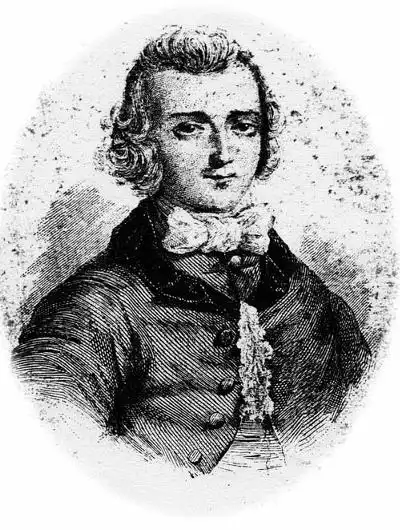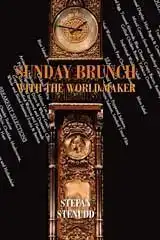Mythology and Fable in the First Encyclopedia: Louis de Jaucourt Theories through History about Myth and Fable 2
Its extensive text on mythology uses fable instead of myth, and starts with a short definition: "Fabled history of the gods, the demigods, and the heroes of antiquity, as is indicated by its name." ["Histoire fabuleuse des dieux, des demi-dieux, & des heros de l'antiquité, comme son nom même le désigne." Louis de Jaucourt, 'Mythologie', Encyclopédie, ou dictionnaire raisonné des sciences, des arts et des métiers, vol. 10, Paris 1765, 924. The English translation by Nelly S. Hoyt and Thomas Cassirer is from umich.edu, retrieved May 7, 2015.] But the text goes on expanding its definition substantially: The Encyclopedia , however, also groups under this heading everything connected with pagan religion, such as the various theological systems and dogmas that arose one after the other throughout the history of paganism; included as well are the mysteries and ceremonies of worship by which paganism paid tribute to its alleged divinities, and the oracles, spells, auguries, auspices and haruspices, presages, prodigies, atonements, devotions, evocations, and the various kinds of divination that were customary. Under this heading also belong the practices and functions of priests, diviners, sibyls, and vestals, as well as feasts and games, sacrifices and victims, temples, altars, tripods, sacrificial instruments, sacred woods, statues, and in general all the symbols that kept idolatry alive throughout so many centuries of man's history. [Encyclopédie, vol. 10, 1765, 924.] It goes on to stress the importance of mythology, focusing on that of Ancient Greece, in order to participate in general conversation, as well as the inspiration it gives the arts. As for the credibility of mythology, Euhemerus and the idea of mythological figures once having been living humans is mentioned and supported: "certain gods or demigods of paganism were men who were deified after death." But it is not the sole explanation. Mythology also contains general physics and metaphysical ideas through images. The text suggests that the parts of mythology with roots in actual history should be distinguished from those of "mystagogic" or philosophical origin: "The latter are a jumbled collection of marvels and absurd nonsense." Still, the text expresses delight, albeit frustrated, with the spectacularity and poetry of mythology, which is "a shapeless, disorganized mass, yet pleasing in its particulars." Louis de Jaucourt, the writer of the text, ends it by concluding about this manifold subject what has to a large extent been true ever since: Thus writers have fallen into a thousand different errors because they wished to give a consistent explanation for all mythology. Each one discovered what his particular genius and his plan of study led him to seek. I might go so far as to say that the physicist finds here by analogy the mysteries of nature, the statesman the subtleties of governments, the philosopher the finest morality, even the chemist the secrets of his art. In short, each one has looked on fable as a country open to conquest which he felt he had the right to raid as it suited his taste and his interests. The Encyclopédie also has an entry for fable, the term later to be replaced with myth, by the same writer. [Louis de Jaucourt, 'Fable', Encyclopédie, ou dictionnaire raisonné des sciences, des arts et des métiers, vol. 6, Paris 1756, 342ff.] Louis de Jaucourt (1704-1780) was a French aristocrat and scholar, who contributed more than anyone else to the first edition of the Encyclopédie on a number of subjects. He had studied at the universities of Geneva, Cambridge and Leiden, and became a member of several academies.] was the most prolific contributor to the Encyclopédie, writing more than 17,000 of the articles and almost a quarter of the whole work. [Frank A. Kafker, ' Notices sur les auteurs des dix-sept volumes de "discours" de l'Encyclopédie', Recherches sur Diderot et sur l'Encyclopédie, vol. 7, 1989, 144.] His text on fable, covering three pages, is longer and more elaborate than that on mythology and focuses on Greek fables. He follows the division of fables into six catgegories given by abbé Banier in the beginning of the same century: historical, philosophical, allegorical, moral, mixed, and fables invented to please. Jaucourt goes on with suggesting 13 different sources to fable or reasons behind their emergence. Here they are, in my interpretation: [Louis de Jaucourt, 'Fable', Encyclopédie, vol. 6, Paris 1756, 342f.]
Several of the above suggested sources of fables are recurring in later writings on myth, as are many of Jaucourt's thoughts on mythology in general.
NEXTThomas Blackwell: Instruction by Fable.
Mythology Meanings Menu
MENUCreation Myths Around the WorldHow stories of the beginning began.
The Meanings of MythologyTheories through history about myth and fable.
Archetypes in MythsThe mythological symbols and what they stand for.
The Logics of MythPatterns of creation.
CREATION MYTHS IN DEPTHCreation in Rig Veda 10:129The paradox of origin, according to an Indian myth.
Genesis 1The first creation story of the bible scrutinized.
Enuma ElishThe ancient Babylonian creation myth.
Xingu Creation of ManThe insoluble solitude of gods and humans.
ContactAbout Cookies
ON MY OTHER WEBSITESPsychoanalysis of MythWhat Sigmund Freud and C. G. Jung thought about myths, their origins and meanings.
Jungian Theories on Myth and ReligionJoseph Campbell, Jordan B. Peterson and other Jungians on mythology and religion.
Myth of CreationAn introduction to the subject of creation myths and the patterns of thought they reveal.
Cosmos of the AncientsWhat the Greek philosophers believed about the cosmos, their religion and their gods.
Life EnergyThe many ancient and modern life force beliefs all over the world explained and compared.
TaoisticTaoism, the ancient Chinese philosophy of life explained. Also, the complete classic text Tao Te Ching online.
|
 Archetypes of Mythology
Archetypes of Mythology Psychoanalysis of Mythology
Psychoanalysis of Mythology Cosmos of the Ancients
Cosmos of the Ancients Life Energy Encyclopedia
Life Energy Encyclopedia Sunday Brunch with the World Maker
Sunday Brunch with the World Maker Fake Lao Tzu Quotes
Fake Lao Tzu Quotes Stefan Stenudd
Stefan Stenudd